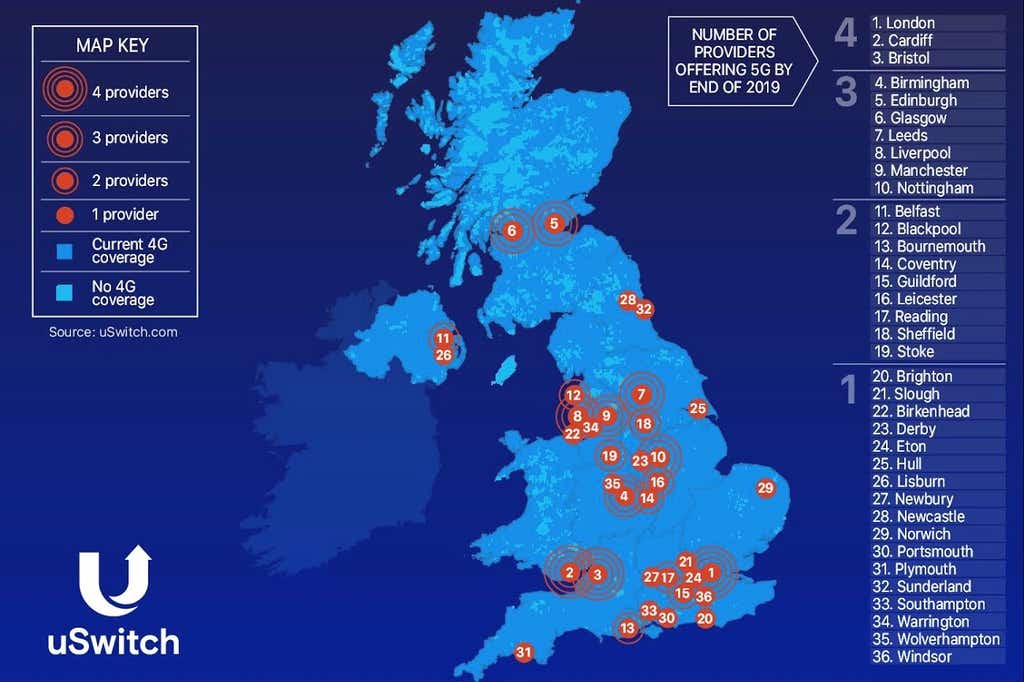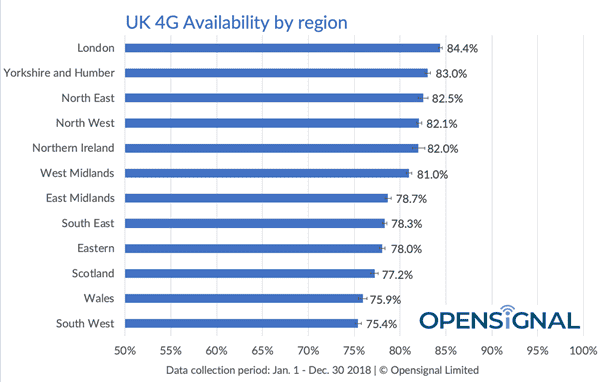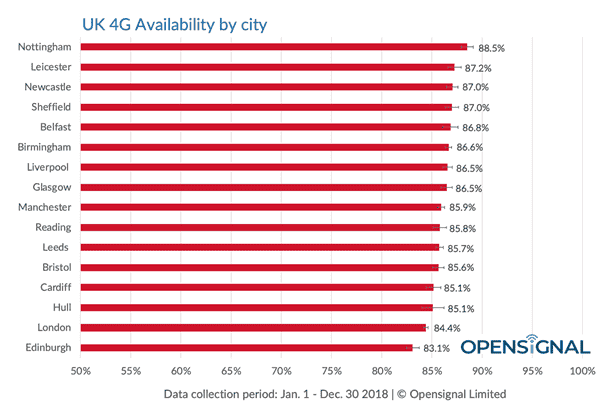23 Million Brits continue to face 4G issues but next generation 5G won’t immediately solve connectivity problems
Mobile providers say 5G will be available by October[1], but 23 million consumers (45%) still struggle to connect to 4G[2]
5G will only be available to a quarter (28%) of the country by the end of 2019, leaving most (72%) lagging behind[3]
Issues connecting to 4G revealed despite Ofcom claiming 66% of UK covered by all major providers[4]
Just one in seven users plan to upgrade to 5G in next year[5], and only a fifth[6] believe 5G will improve their connectivity
With all major networks set to have rolled out 5G by October[1], more than 23 million phone users[2]are still experiencing difficulties connecting to 4G, including more than 5 million[7] struggling every day — according to new research from Uswitch.com, the price comparison and switching service.
A third (33%) of adult smartphone users[8] — 17.1 million people — have trouble connecting to 4G at least once a week, despite telecoms watchdog Ofcom claiming that 67% of the UK has 4G coverage from all major operators[4].
This means that almost a third of the country[2] is frequently forced to rely on a 3G signal — two generations behind the current cutting edge technology.
The launch of 5G looks unlikely to solve the problem, with all 34 locations[1] due to get coverage by the end of 2019 being cities or large urban areas. London and Cardiff will soon be served by four 5G networks, and customers in Bristol, Edinburgh, Birmingham and Manchester will have the choice of three providers.
Only 28% of the country will have 5G by the end of 2019, with 72% of the population left without access to fifth-generation connectivity in the near future[3].
Graphic: Map of 4G and 5G provision in the UK

New data from Opensignal and Uswitch reveals that three quarters (75%) of the South West is covered by 4G[9]. Huge swathes of the region will miss out on 5G in the short term as the technology is only due to come to Bristol and Plymouth by the end of 2019[1].
Wales and Scotland are also lagging behind the rest of the country in 4G availability, at 76% and 77% respectively[10]. Cardiff is the sole place in Wales that will be served by 5G before 2020, while Glasgow and Edinburgh are Scotland’s only places due to get fifth-generation technology in the near future.
Chart: UK 4G Availability by region

The digital divide is highlighted by the low 4G Availability figures in rural areas, while the UK’s major cities all have more than 80% 4G Availability according to Opensignal’s data[10].
Nottingham has the highest 4G Availability in the UK, with 89% of the city served by fourth-generation services.
Chart: UK 4G Availability by city

London surprisingly comes 15th out of 16 cities, with Opensignal users in the capital only able to connect to 4G 84% of the time. Only Edinburgh has worse 4G Availability, with Opensignal’s users only able to access 4G 83% of the time.
The Opensignal data is backed up by the evidence of mobile phone users, with three out of five Londoners (60%)[11] saying they had experienced difficulty connecting to 4G. This is the highest rate of complaints in the country. By comparison, less than a third (31%) in Newcastle reported such problems[12].
Across the country, a third (32%) of phone users[13] struggle with 4G connectivity at home, while 5 million people[13] have issues connecting while on public transport.
Despite connectivity issues, three quarters (73%) of phone users[14] have not changed network in the past two years. And a quarter (22%) of people[15] have not changed network for more than five years, even though almost half of them continue to experience 4G issues.
It is hoped that the arrival of 5G services will help address the UK’s coverage issues, but only one in seven phone users (14%) plan to upgrade to the new technology within the next year[5]. Even those who struggle with 4G are unconvinced by the merits of 5G, with only a fifth (22%) intending to switch in the near future despite their ongoing connectivity issues[16].
Only a fifth of people (19%) think 5G will improve connectivity[6], with almost a third (30%) thinking it will be more expensive[17], despite Vodafone and Three already announcing that their 5G services will be priced the same as 4G.
With both national coverage and consumer experience of mobile services so variable, Uswitch.com is warning that 5G will not solve the problems that currently exist in rural areas, and is urging providers to work with communities to improve rural mobile coverage.
Ernest Doku, mobiles expert at Uswitch.com, comments: “With so many of us completely reliant on our smartphones these days for our news, work, shopping and social media updates, there is little more frustrating than being unable to connect to phone services which we pay for.
“Ofcom reports that 66% of the UK has 4G coverage from all major provider, but more than 23 million people are still facing difficulties connecting to their networks.
“This can sometimes be blamed on network congestion at busy times, but often the capacity simply isn’t there for the numbers of people wanting to access a service they have paid for.
“The arrival of the next generation infrastructure should help with some of the problems currently experienced by 4G users, but this will not be an overnight solution, in particular as fewer than one in seven of us is planning to upgrade to 5G in the next year.
“Don’t suffer in silence and get blinded by all the chatter about 5G, if you are struggling with connectivity go back to basics and look at a couple of coverage maps, or install an app like Opensignal’s to see who has the best reception for coverage for you.
“However, the industry cannot use the launch of 5G as a band aid to cover up the shortcomings of 4G. Providers must work with communities to improve connectivity, especially in rural areas, to prevent millions of people being left stranded on technology two generations out of date.
“Unless networks improve their coverage in rural areas, the risk is that 5G will make the same mistakes as 4G and predominantly serve the cities at the expense of more rural areas of the country.”
Find out how you could save over £1,000 a year with Uswitch here.
FOR MORE INFORMATION
Rory Stoves
Phone: 020 3872 5613
Email: rory.stoves@uswitch.com
Twitter: @UswitchPR
Notes to editors
Opinium surveyed a sample of 2,010 UK adults from the 26th to 29th July 2019. Results have been weighted to reflect a nationally representative criteria
Table: Locations and the number of networks providing 5G there by the end of 2019
| Location | EE | 02 | Three | Vodafone | TOTAL |
| Cardiff | ✓ | ✓ | ✓ | ✓ | 4 |
| London | ✓ | ✓ | ✓ | ✓ | 4 |
| Birmingham | ✓ | ✓ | ✓ | 3 | |
| Bristol | ✓ | ✓ | 3 | ||
| Edinburgh | ✓ | ✓ | ✓ | 3 | |
| Manchester | ✓ | ✓ | ✓ | 3 | |
| Belfast | ✓ | ✓ | 2 | ||
| Blackpool | ✓ | ✓ | 2 | ||
| Bournemouth | ✓ | ✓ | 2 | ||
| Glasgow | ✓ | ✓ | 2 | ||
| Guildford | ✓ | ✓ | 2 | ||
| Leeds | ✓ | ✓ | 2 | ||
| Liverpool | ✓ | ✓ | 2 | ||
| Nottingham | ✓ | ✓ | 2 | ||
| Reading | ✓ | ✓ | 2 | ||
| Stoke | ✓ | ✓ | 2 | ||
| Birkenhead | ✓ | 1 | |||
| Brighton | ✓ | 1 | |||
| Coventry | ✓ | 1 | |||
| Derby | ✓ | 1 | |||
| Eton | ✓ | 1 | |||
| Leicester | ✓ | 1 | |||
| Lisburn | ✓ | 1 | |||
| Newbury | ✓ | 1 | |||
| Norwich | ✓ | 1 | |||
| Plymouth | ✓ | 1 | |||
| Portsmouth | ✓ | 1 | |||
| Sheffield | ✓ | 1 | |||
| Slough | ✓ | 1 | |||
| Southampton | ✓ | 1 | |||
| Sunderland | ✓ | 1 | |||
| Warrington | ✓ | 1 | |||
| Windsor | ✓ | 1 | |||
| Wolverhampton | ✓ | 1 |
Respondents were asked ‘Do you ever experience difficulty connecting to 4G services from your smartphone?’ A net total of 45% said ‘Yes’. Total adults in the UK is 52,078,536. 45% of 52,078,536 is 23,435,341 people who experience difficulty connecting to 4G services
2011 census population data
Ofcom Connected Nations Update, Spring 2019
Respondents were asked ‘Do you plan to upgrade to 5G services within the next year?’ 14% answered ‘Yes’
Respondents were asked whether they thought the statement ‘5G will improve my connectivity compared to 4G’ was true. 19% answered that they did believe the statement
Respondents who answered ‘Yes’ to experiencing difficulty connecting to 4G services were asked ‘How often do you experience difficulty connecting to 4G services from your smartphone?’ 14% answered ‘Multiple times every day’ and 8% answered ‘Once a day’ giving a net 22% for those who have difficulty at least once a day. 22% of 23,435,341 is 5,155,775 people who experience difficulty connecting to 4G services every day
Respondents who answered ‘Yes’ to experiencing difficulty connecting to 4G services were asked ‘How often do you experience difficulty connecting to 4G services from your smartphone?’ Net ‘once a week or more’ was 73%. 73% of 23,435,341 is 17,107,799
See table in release
See table in release
Of the respondents surveyed, 262 reside in London. 156 of these answered ‘Yes’ when asked ‘Do you ever experience difficulty connecting to 4G services from your smartphone?’ 156/262 = 60%
Of the respondents surveyed, 87 reside in Newcastle. 27 of these answered ‘Yes’ when asked ‘Do you ever experience difficulty connecting to 4G services from your smartphone?’ 27/87 = 31%
Respondents who answered ‘Yes’ to experiencing difficulty connecting to 4G services were asked ‘Where do you most commonly experience connectivity issues?’ 32% answered ‘At home’ and 22% answered ‘On public transport’. 22% of 23,435,341 is 5,155,775 people who experience 4G difficulties on public transport
Respondents were asked ‘When did you last change your mobile phone network?’ 11% answered ‘In the last year’ and 16% answered ‘Between 1-2 years ago’, leaving 73% who have not changed network within the last two years.
Respondents were asked ‘When did you last change your mobile phone network?’ 22% answered ‘Over 5 years ago’. Of these, 43% answered ‘Yes’ when asked if they experienced difficulty connecting to 4G services
Respondents were asked ‘Do you plan to upgrade to 5G services within the next year?’ Of those who answered ‘Yes’, 22% had answered ‘Yes’ when asked if they experienced difficulty connecting to 4G services
Respondents were asked whether they thought the statement ‘5G will be more expensive than 4G’ was true. 30% answered that they did believe the statement.
About us
It’s all about “U”!
Thank you for indulging us over the last 20 years by using a small ‘u’ and a big ‘S’ when writing about our brand in your articles.
We are delighted to let you know that you are now off the hook - it’s big U’s all the way (and small s’s) as we undertake our biggest ever rebrand - so let your autocorrect go wild!
About Uswitch
Uswitch is the UK’s top comparison website for home services switching. Launched in September 2000, we help consumers save money on their gas, electricity, broadband, mobile, TV, and financial services products and get more of what matters to them. Last year we saved consumers over £373 million on their energy bills alone.
Uswitch is part of RVU, a new business that also owns Money.co.uk and Bankrate.
If you would no longer like to receive our press releases please email prteam@uswitch.com with 'unsubscribe'.